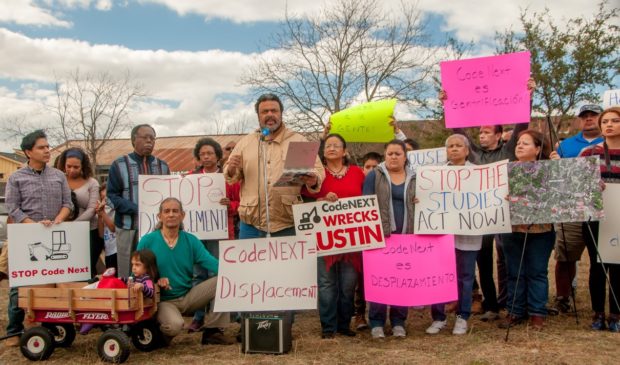The Austin people have spoken through six resolutions on displacement and gentrification
Thursday, February 8, 2018 by
Jessi Devenyns In Austin, it appears that the people have a plan. This past Martin Luther King Jr. Day, Susana Almanza of People Organized in Defense of Earth and her Resources (PODER) and Fred McGhee of Preserve Rosewood revealed the People’s Plan: a group of six resolutions/draft ordinances that are aimed at creating solutions for displacement and gentrification.
These resolutions are part of Austin’s Poor People’s Campaign, which is a reinvigorated branch of the national 1968 campaign that strove to gain economic justice for poor people in the United States.
On Feb. 2, Almanza and McGhee came to the Anti-Displacement Task Force meeting to formally ask for the endorsement and recommendation of their resolutions to City Council. McGhee called these six resolutions a first step and an “interim measure” in an effort to establish more permanent, equitable housing solution for low-income Austinites.
“The time for half-measures and talk is over,” he said. “This is a crisis.”
The six proposed measures are resolutions to establish a low-income housing trust fund and appropriations, adopt right to stay and right to return programs for East Austin, grant the use of city-owned land for low-income housing, establish interim development regulations in areas with inadequate drainage, expand the use of neighborhood conservation combined districts and historic districts, and implement Austin environmental quality review.
McGhee explained that it takes “political courage” and financial backing to champion the poor. “We must realize that equity isn’t free, it costs money,” he said.
Almanza agreed and suggested that if the task force was ready to act instead of just “studying, studying, studying, studying,” recommending these resolutions to Council was the first step.
Task force member Ann Teich wondered if the body’s endorsement of these resolutions would have any political weight. For that to be the case she explained that Council members and representatives needed to be intimately aware and involved with the development of these proposals and not just briefed through another recommendation.
“The people who make the decisions and create policy aren’t here,” she said. “Do we have to lobby them for this?” As it turned out, the mayor’s office was already aware of the meeting: It had done its due diligence and sent a representative to listen to the presentation.
Dr. Jane Rivera, who chairs the Parks and Recreation Board, came to speak as a member of the public and former co-chair of the Mayor’s Task Force on Institutional Racism and Systemic Inequities. She told the task force that whatever it chooses to present to Council, “You must make your recommendations in the form of an actionable resolution.”
McGhee noted that all the recommendations that he and Almanza presented were “targeted, simple and actionable.”
Teich reiterated that even if the task force presents Council with actionable recommendations, it’s important that Council be present to hear the needs of the people whom the Anti-Displacement Task Force serves. She told the Austin Monitor that as it stands, “we care more about our animals than our people.”
Photo by Rene Renteria.
The Austin Monitor’s work is made possible by donations from the community. Though our reporting covers donors from time to time, we are careful to keep business and editorial efforts separate while maintaining transparency. A complete list of donors is available here, and our code of ethics is explained here.
You're a community leader
And we’re honored you look to us for serious, in-depth news. You know a strong community needs local and dedicated watchdog reporting. We’re here for you and that won’t change. Now will you take the powerful next step and support our nonprofit news organization?








